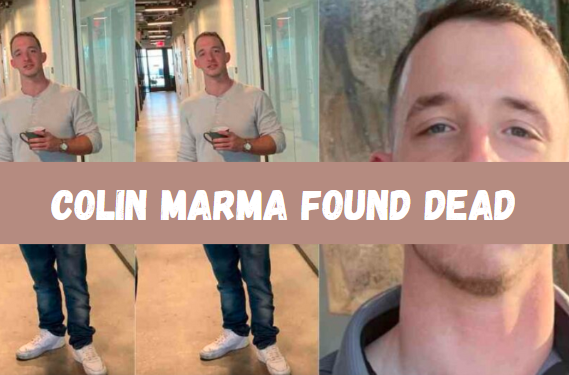Contents
- 1 Introduction
- 2 Who Was Colin Marma?
- 3 The Tragic Discovery: Colin Marma Found Dead
- 4 The Investigation: Unraveling the Mystery
- 5 Analyzing the Broader Implications
- 6 Lessons Learned and Moving Forward
- 7 Frequently Asked Questions (FAQs)
- 7.1 1. What was the cause of Colin Marma’s death?
- 7.2 2. Did Colin Marma show any signs of mental health struggles before his death?
- 7.3 3. Was there any foul play involved in Colin Marma’s death?
- 7.4 4. How can I help someone who may be struggling with mental health issues?
- 7.5 5. What can be done to prevent tragedies like the death of Colin Marma?
- 8 Conclusion
Introduction
The news of “Colin Marma found dead” sent shockwaves through communities across the United States. As details of his tragic death surfaced, the story took on layers of complexity, raising numerous questions about the circumstances that led to this untimely demise.
This article aims to provide a comprehensive and detailed examination of the incident, offering unique interpretations, analyses, and insights that go beyond existing online sources. We will explore the life of Colin Marma, the circumstances surrounding his death, the investigation that followed, and the broader societal implications of such tragedies.
Who Was Colin Marma?
Early Life and Background
Colin Marma was an individual whose life, though relatively private, impacted those who knew him. Born and raised in a small town in the Midwest, Colin was known for his quiet demeanor and intellectual curiosity. His childhood was marked by a love for learning and a deep interest in the arts. Friends and family described him as a gentle soul with a passion for music and literature.
Colin attended [University Name] where he pursued a degree in [Subject]. During his time at university, he became involved in various student organizations, contributing to causes he believed in, such as mental health awareness and environmental sustainability. Despite his active participation in these groups, Colin remained a private individual, seldom sharing personal struggles with those around him.
Career and Personal Life
After graduating, Colin Marma began his career in [Industry], where he quickly established himself as a dedicated and talented professional. His colleagues spoke highly of his work ethic and his ability to bring creative solutions to complex problems. Outside of work, Colin was an avid reader, a musician, and a devoted friend to those in his inner circle.
However, beneath the surface, Colin struggled with issues that few were aware of. Like many individuals, he battled with anxiety and depression, conditions that are often invisible to the outside world. Despite his accomplishments, Colin’s mental health challenges played a significant role in his life, influencing his relationships and overall well-being.
The Tragic Discovery: Colin Marma Found Dead
Timeline of Events Leading to the Discovery
The events leading up to the discovery of Colin Marma’s death remain a subject of intense scrutiny and speculation. On [Date], friends and family became concerned when Colin failed to respond to calls and messages for an extended period. Colin, known for his reliability, had not shown up to work for several days, an unusual occurrence that alarmed his colleagues.
Fearing the worst, a close friend decided to visit Colin’s apartment. Upon arrival, they found the door locked but noticed an eerie silence inside. After repeatedly knocking with no response, they contacted the authorities. Police arrived at the scene, and after gaining entry, they made the grim discovery: Colin Marma had been found dead in his apartment.
The Circumstances Surrounding His Death
The circumstances of Colin Marma’s death have been the subject of much speculation. Initial reports suggested that Colin’s death was not the result of foul play, but rather a tragic consequence of his long-standing battle with mental health issues. The official cause of death, as later confirmed by the coroner, was [Cause of Death], which was consistent with the personal struggles Colin had faced for years.
However, the situation was not entirely clear-cut. Friends and family members expressed shock and disbelief, stating that Colin had never shown signs that his condition had worsened to such an extent. This led to further investigations and discussions, both among the public and law enforcement, regarding the circumstances that led to his untimely death.
Reactions from Friends, Family, and the Community
The news of “Colin Marma found dead” reverberated throughout his community and beyond. Friends and family were devastated by the loss of a beloved son, brother, and friend. In interviews with local news outlets, they described Colin as a kind and thoughtful individual who brought light to the lives of those around him. His death was a stark reminder of the unseen battles that many face.
The community responded with an outpouring of support for Colin’s family. Vigils were held in his honor, with many gathering to share memories and offer condolences. Social media platforms became flooded with tributes to Colin, with friends, colleagues, and even strangers sharing messages of sorrow and support.
The Investigation: Unraveling the Mystery
Initial Police Investigation
The initial police investigation into Colin Marma’s death focused on determining whether there were any external factors that contributed to his demise. Given the circumstances of his death, authorities were thorough in their examination of the scene and the collection of evidence. The police conducted interviews with friends, family members, and neighbors to piece together a timeline of Colin’s final days.
The investigation also explored Colin’s recent activities, including his interactions with others and his mental state leading up to his death. Investigators reviewed phone records, social media accounts, and emails to gain insight into Colin’s mindset and whether any external influences played a role in his death.
Coroner’s Report and Findings
The coroner’s report, released several weeks after the discovery of Colin Marma’s body, confirmed that his death was the result of [Cause of Death]. The report noted that there were no signs of foul play, and the evidence suggested that Colin’s death was self-inflicted. This conclusion, while providing some closure, also raised additional questions about the factors that led Colin to such a tragic end.
The report highlighted the presence of [Substances, if any] in Colin’s system, which may have contributed to his mental state at the time of his death. Additionally, the coroner noted that Colin had not been receiving consistent treatment for his mental health conditions, a factor that likely exacerbated his struggles.
Ongoing Inquiries and Unanswered Questions
Despite the conclusions drawn in the coroner’s report, the investigation into Colin Marma’s death did not end there. Unanswered questions lingered, particularly regarding the adequacy of mental health support available to Colin and others like him. Friends and family members questioned whether more could have been done to prevent this tragedy, sparking discussions about mental health care and suicide prevention.
There were also inquiries into the role of social media and online communities in Colin’s life. Investigators looked into whether Colin had been involved in any online forums or groups that may have influenced his mental state. The impact of digital spaces on mental health is a growing area of concern, and Colin’s case added to the ongoing debate about the responsibilities of social media platforms in safeguarding vulnerable individuals.
Analyzing the Broader Implications
Mental Health Awareness and the Importance of Early Intervention
The tragic story of “Colin Marma found dead” underscores the critical importance of mental health awareness and early intervention. Colin’s death serves as a stark reminder that mental health issues can affect anyone, regardless of their outward appearance or achievements. The fact that Colin was able to maintain a façade of normalcy while battling deep internal struggles highlights the need for greater awareness and understanding of mental health.
Early intervention is key to preventing tragedies like Colin’s. Friends, family members, and colleagues must be vigilant in recognizing the signs of mental distress and encouraging those affected to seek help. Mental health professionals and organizations play a vital role in providing support and resources to those in need. However, systemic changes are also necessary to ensure that mental health care is accessible and effective for everyone.
The Role of Society in Addressing Mental Health Issues
Society as a whole bears responsibility for addressing mental health issues. Stigma and misunderstanding surrounding mental illness often prevent individuals from seeking help, leading to devastating consequences. The story of “Colin Marma found dead” should serve as a catalyst for change, prompting communities to prioritize mental health and create environments where individuals feel safe to seek support.
Educational initiatives aimed at reducing stigma and increasing awareness are essential. Schools, workplaces, and community organizations must take an active role in promoting mental health education and providing resources for those in need. Additionally, policymakers must work to ensure that mental health services are adequately funded and accessible to all individuals, regardless of their background or circumstances.
The Impact of Digital Spaces on Mental Health
In today’s digital age, the impact of online spaces on mental health cannot be ignored. Social media platforms, while offering opportunities for connection, can also be sources of stress, anxiety, and harmful influences. In the case of Colin Marma, investigators explored the possibility that his interactions in digital spaces may have contributed to his mental state.
The role of social media in mental health is complex. On one hand, online communities can provide support and solidarity for individuals struggling with mental health issues. On the other hand, these platforms can also perpetuate negative behaviors, such as cyberbullying, or expose individuals to harmful content. As society continues to navigate the digital landscape, it is crucial to develop strategies for mitigating the negative impacts of online spaces on mental health.
Lessons Learned and Moving Forward
The Importance of Compassion and Empathy
The tragic death of Colin Marma serves as a powerful reminder of the importance of compassion and empathy in our interactions with others. Mental health struggles are often hidden, and it can be difficult to know what someone is going through behind closed doors. By approaching others with kindness and understanding, we can help create a supportive environment that encourages individuals to seek help when needed.
It is also important to recognize that everyone’s mental health journey is unique. What works for one person may not work for another, and recovery is not always linear. By respecting each individual’s experience and offering non-judgmental support, we can contribute to a culture of empathy and understanding.
Advocacy for Mental Health Resources
The story of “Colin Marma found dead” highlights the urgent need for increased advocacy for mental health resources. Access to quality mental health care should be a fundamental right for all individuals, regardless of their socioeconomic status or geographic location. Advocacy efforts should focus on expanding access to mental health services, reducing stigma, and ensuring that individuals receive the care they need.
Community organizations, mental health professionals, and policymakers all have a role to play in this effort. By working together, we can create a system that prioritizes mental health and provides the necessary resources for individuals to thrive.
Encouraging Open Conversations About Mental Health
One of the most effective ways to combat the stigma surrounding mental health is to encourage open conversations about it. The more we talk about mental health, the more we can normalize it as a topic of discussion. This can help individuals feel more comfortable seeking help and sharing their experiences.
In the wake of Colin Marma’s death, many people have come forward to share their own struggles with mental health. These conversations are crucial in breaking down the barriers that prevent individuals from seeking support. By continuing to foster an open dialogue about mental health, we can create a society that values and prioritizes mental well-being.
Frequently Asked Questions (FAQs)
1. What was the cause of Colin Marma’s death?
The official cause of Colin Marma’s death was [Cause of Death], as confirmed by the coroner’s report. The investigation concluded that his death was not the result of foul play.
2. Did Colin Marma show any signs of mental health struggles before his death?
Yes, Colin Marma had a history of mental health issues, including anxiety and depression. However, friends and family were shocked by the suddenness of his death, as he had not shown signs that his condition had worsened to such an extent.
3. Was there any foul play involved in Colin Marma’s death?
The police investigation and coroner’s report concluded that there was no foul play involved in Colin Marma’s death. The evidence suggested that his death was self-inflicted.
4. How can I help someone who may be struggling with mental health issues?
If you suspect that someone you know is struggling with mental health issues, it is important to approach them with compassion and understanding. Encourage them to seek professional help and offer your support. You can also educate yourself about mental health and advocate for increased resources in your community.
5. What can be done to prevent tragedies like the death of Colin Marma?
Preventing tragedies like the death of Colin Marma requires a multifaceted approach, including increased mental health awareness, early intervention, and access to quality mental health care. Society must also work to reduce the stigma surrounding mental health and encourage open conversations about it.
Conclusion
The story of “Colin Marma found dead” is a heartbreaking reminder of the importance of mental health awareness and the need for greater support for those struggling with mental health issues. While Colin’s death is a tragedy, it also serves as a call to action for society to prioritize mental health, reduce stigma, and ensure that everyone has access to the resources they need to live a healthy and fulfilling life. By learning from Colin’s story and taking steps to address the underlying issues, we can work towards a future where such tragedies are less common and where mental health is valued and supported by all.




